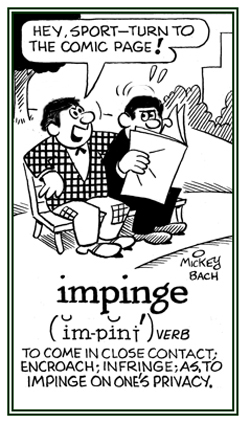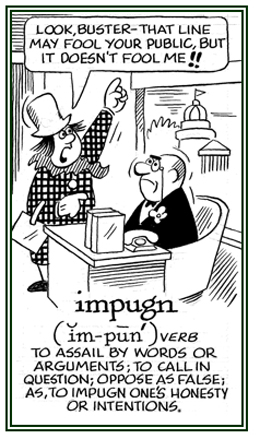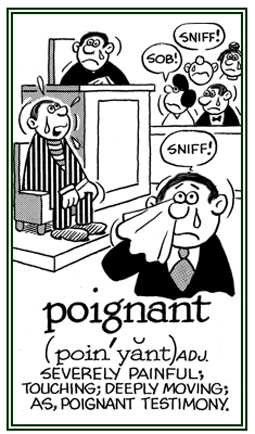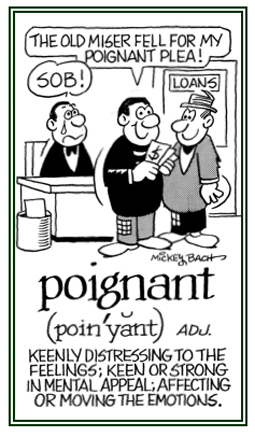pung-, punc-, punct-
(Latin: pungere, punctum to strike, to hit, to punch, to pierce, to puncture, to point, to sting, to bite; a dot, a mark; a point, a sharp point, a pinpoint)
These vocabulary roots have developed a confusing family of words which, on the surface, do not seem to be related; however, the entries in this unit really are derived from the roots and the meanings that appear in the headings of this unit.
2. A bodily disorder in which the faces are wedged tightly in the lower colon: After a postmortem was done, the specialist diagnosed the horse to have had an impaction, or a solid immobile bulk of stool, due to dehydration and colitis in the stomach.
3.The condition of being pressed firmly or tightly together: The impaction of earwax, or cerumen, against the eardrum caused tinnitus in Adam's ears.
4. A situation of a tooth being crowded in its socket and which cannot erupt in a normal way: When Martin went to the dentist's for a regular checkup, his dentist diagnosed an impaction in Martin's upper row of teeth and told him that it had to be taken care of right away.
Manfred tried to sleep, but the loud sounds of the traffic outside the hotel impinged on his ears and kept him awake for quite awhile.
2. To trespass, to interfere with, to intrude, to impose, or to encroach: The weeds in Jim's yard have impinged significantly and have grown completely over the sidewalk because he and his family had been away traveling for over two months!Claudia sometimes felt that her mother was impinging on her right to raise her children in her own way.
3. Etymology: "to fasten or to fix forcibly"; from Latin impingere "to drive into, to strike against"; from an assimilated form of in-, "into, in, on, upon" + pangere, "to fix, to fasten".
Go to this Word A Day Revisited Index
so you can see more of Mickey Bach's cartoons.
2. A situation having an effect on something or someone: Jack hoped that the tragic accident of his wife's mother would not cause too much impingement on her life.
3. The action of dashing against or colliding with something; collision: Because of a knee impingement causing him to be injured, Thomas was not able to play in the next soccer game.
2. To attack as false, questionable, or wrong: Jack's mother impugned his comments that he was being mistreated because he was not being allowed to have a cell phone any more, when actually he had been using it too often and not doing any of the normal things which he should have been accomplishing.

Go to this Word A Day Revisited Index
so you can see more of Mickey Bach's cartoons.
Lumbar puncture is especially helpful in the diagnosis of inflammatory diseases of the central nervous system, especially infections, such as meningitis. Lumbar puncture can also provide clues to the diagnosis of stroke, spinal cord tumor, and cancer in the central nervous system.
A lumbar puncture is so-called because the needle goes into the lumbar portion of the back. Other names for a lumbar puncture (an LP) include spinal puncture, thecal puncture, and rachiocentesis.
A lumbar puncture can also be done for therapeutic purposes, namely as a way of administering antibiotics, cancer drugs, or anesthetic agents into the spinal canal.
Spinal fluid is sometimes removed by lumbar puncture for the purpose of decreasing spinal fluid pressure in patients with uncommon conditions, such as normal-pressure hydrocephalus and benign intracranial hypertension.
After a local anesthesia is injected into the small of the back (the lumbar area), a needle is inserted in between the nearby bony building blocks (vertebrae) into the spinal canal to make the lumbar puncture. The needle is usually placed between the 3rd and 4th lumbar vertebrae. Spinal fluid pressure can then be measured and cerebrospinal fluid (CSF) removed for testing.
The cerebrospinal fluid circulates around the brain and spinal cord (the central nervous system). This "water bath" acts as a support of buoyancy for the brain and spinal cord. The support of the cerebrospinal fluid helps to protect the brain from injury.
Spinal fluid obtained from the lumbar puncture can be used to diagnose many important diseases, such as bleeding around the brain, increased pressure from hydrocephalus, inflammation of the brain, spinal cord, or the adjacent tissues (encephalitis, meningitis); tumors of brain or spinal cord, etc. Sometimes spinal fluid can indicate diseases of the immune system, such as multiple sclerosis.
When spinal fluid is removed during a lumbar puncture, the risks include headache, brain herniation, bleeding, and infection. Each of these complications are uncommon with the exception of headache, which can appear from hours to up to a day after lumbar puncture.
Headaches occur less frequently when the patient remains lying flat one to three hours after the procedure. The benefits of the lumbar puncture depend on the exact situation, but a lumbar puncture can usually provide lifesaving information.
2. The power of taste that stimulates; piquancy: The poignancy of the spaghetti sauce at the restaurant was especially zesty and had an intense flavor.
2. Very distressing to the mind or feelings: Sally was at the point of poignant anxiety regarding her father’s state of health, and it was a great relief when the doctor’s diagnosis turned out to be negative because he said that her father didn’t have cancer after all.
3. Profoundly moving; emotionally touching: Janet had a very poignant memory of her best girlfriend’s wedding because she was radiating with joy and so beautiful in her white dress. In fact, Janet was so affected by the simple, yet elegant service, that she had to reach for her hanky to dry her tears!
4. Piercing; incisive: Linda’s poignant criticism was aimed at her sister, telling her that she had no right to borrow her dress without asking first.
5. Neat, skillful, and to the point: There were some very poignant illustrations supplementing the fairy tales by Hans Christian Andersen, taking the young reader into the world of fantasy with characters; such as “Thumbelina” or “The Wild Swans”.
6. Astute and pertinent; relevant: The supervisor made some very poignant suggestions to the student teacher on how he could catch the students’ complete attention and motivate them at the beginning of the lesson.
7. Agreeably intense or stimulating: Lynn was filled with very poignant delight when she was planning a trip to California with her two daughters to show them where she came from, especially since she had not been there in more than 40 years!
8, Etymology: from Latin pungere, "stick into, pierce". The sense of poignant, "sharp, piercing" was adopted into French through Anglo-French as poindre. It went into Middle English as poynaunt, then during the 1700s, the French spelling was restored and poignant became the standard form of the word.


Go to this Word A Day Revisited Index
so you can see more of Mickey Bach's cartoons.
2. A certain moment in an event: At one particular point during the conference, Jill suggested a further item to be discussed.
3. A topic or issue of conversation; the main idea: When the hikers got lost, they agreed on one point - to stay together, whatever might happen!
4. An objective or aim that makes something important or significant: After the conclusion of the meeting and the decision had been made, there was no point in continuing about other options.
5. A certain place or location: Before the hikers devided up into small groups, they decided to meet at a specific point on the trail for lunch.
5. A sharp tip of something: Joan said, "Be careful, Joe. The knife has a very jagged point and it isn't dull at all!"
2. To instruct a person or encourage someone to go in a specific direction: If Mary asks for a drink of water, point her to the faucet in the kitchen!
3. To aim at an object: The hunter pointed his gun at the huge wolf that was going to attack him.
2. One of a breed of English muscular dogs: The pointer that the hunter had was agile and had short and smooth hair that was white with black patches on it.
3. A long slender piece of metal on a dial or scale that moves to indicate a certain position: The pointer, or hand, on the wall clock showed that it was twenty minutes past nine.
2. Etymology: from Middle French poinard; from Old French poignal, "dagger"; literally, "anything grasped with the fist", from poing, "fist", from Latin pungus, "strike, hit".


